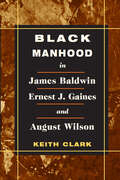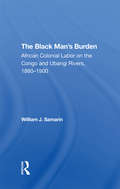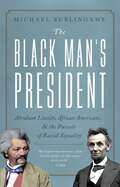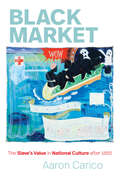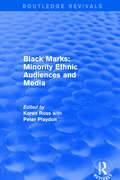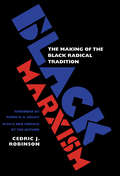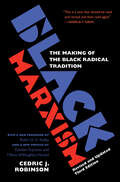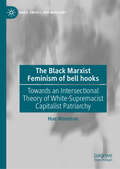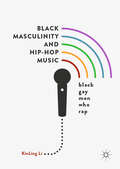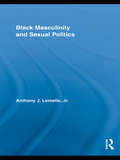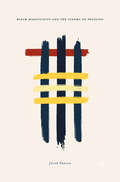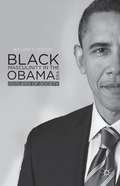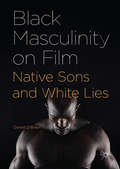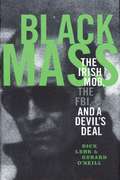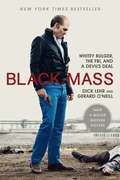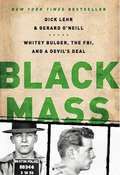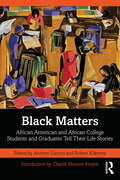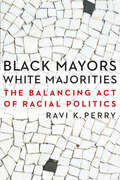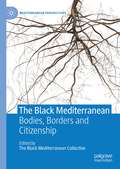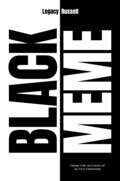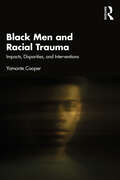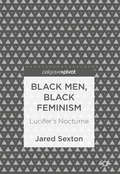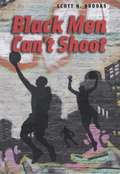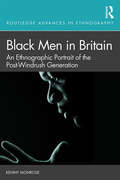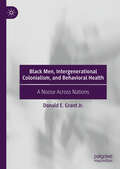- Table View
- List View
Black Manhood in James Baldwin, Ernest J. Gaines, and August Wilson
by Keith ClarkFrom Frederick Douglass to the present, the preoccupation of black writers with manhood and masculinity is a constant. Black Manhood in James Baldwin, Ernest J. Gaines, and August Wilson explores how in their own work three major African American writers contest classic portrayals of black men in earlier literature, from slave narratives through the great novels of Richard Wright and Ralph Ellison. Keith Clark examines short stories, novels, and plays by Baldwin, Gaines, and Wilson, arguing that since the 1950s the three have interrupted and radically dismantled the constricting literary depictions of black men who equate selfhood with victimization, isolation, and patriarchy. Instead, they have reimagined black men whose identity is grounded in community, camaraderie, and intimacy. Delivering original and startling insights, this book will appeal to scholars and students of African American literature, gender studies, and narratology.
The Black Man's Burden: African Colonial Labor On The Congo And Ubangi Rivers, 1880-1900
by William J. SamarinThis book is an enquiry into early European colonial expansion in Central Africa especially in upper Zaire (Congo) and Ubangi rivers. It explores the extent to which French and Belgian colonial enterprise were dependent on the African labor and their penetration into Zaire basin.
The Black Man's President: Abraham Lincoln, African Americans, and the Pursuit of Racial Equality
by Michael BurlingameFrederick Douglass called the martyred president "emphatically the black man's president&” as well as &“the first who rose above the prejudice of his times and country.&” This narrative history of Lincoln&’s personal interchange with Black people over the course his career reveals a side of the sixteenth president that, until now, has not been fully explored or understood.In a little-noted eulogy delivered shortly after Lincoln's assassination, Frederick Douglass called the martyred president "emphatically the black man's president," the "first to show any respect for their rights as men.&” To justify that description, Douglass pointed not just to Lincoln's official acts and utterances, like the Emancipation Proclamation or the Second Inaugural Address, but also to the president&’s own personal experiences with Black people. Referring to one of his White House visits, Douglass said: "In daring to invite a Negro to an audience at the White House, Mr. Lincoln was saying to the country: I am President of the black people as well as the white, and I mean to respect their rights and feelings as men and as citizens.&” But Lincoln&’s description as &“emphatically the black man&’s president&” rests on more than his relationship with Douglass or on his official words and deeds. Lincoln interacted with many other African Americans during his presidency His unfailing cordiality to them, his willingness to meet with them in the White House, to honor their requests, to invite them to consult on public policy, to treat them with respect whether they were kitchen servants or leaders of the Black community, to invite them to attend receptions, to sing and pray with them in their neighborhoods—all those manifestations of an egalitarian spirit fully justified the tributes paid to him by Frederick Douglass and other African Americans like Sojourner Truth, who said: "I never was treated by any one with more kindness and cordiality than were shown to me by that great and good man, Abraham Lincoln.&” Historian David S. Reynolds observed recently that only by examining Lincoln&’s &“personal interchange with Black people do we see the complete falsity of the charges of innate racism that some have leveled against him over the years.&”
Black Market: The Slave's Value in National Culture after 1865 (Studies in United States Culture)
by Aaron CaricoOn the eve of the Civil War, the estimated value of the U.S. enslaved population exceeded $3 billion--triple that of investments nationwide in factories, railroads, and banks combined, and worth more even than the South's lucrative farmland. Not only an object to be traded and used, the slave was also a kind of currency, a form of value that anchored the market itself. And this value was not destroyed in the war. Slavery still structured social relations and cultural production in the United States more than a century after it was formally abolished. As Aaron Carico reveals in Black Market, slavery's engine of capital accumulation was preserved and transformed, and the slave commodity survived emancipation. Through both archival research and lucid readings of literature, art, and law, from the plight of the Fourteenth Amendment to the myth of the cowboy, Carico breaks open the icons of liberalism to expose the shaping influence of slavery's political economy in America after 1865. Ultimately, Black Market shows how a radically incomplete and fundamentally failed abolition enabled the emergence of a modern nation-state, in which slavery still determined--and now goes on to determine--economic, political, and cultural life.
Black Marks: Minority Ethnic Audiences and Media
by Karen Ross Peter PlaydonThis title was first published in 2001. This text brings together a collection of empirical studies focusing on the relationships which minority ethnic audiences have with and to media texts, both mainstream and minority. The media which comprise the focus for the essays include television, film, advertising, magazines and the press. The field of media studies has moved beyond the model of media consumer as passive recipient towards individuals and groups who are altogether more engaged, responsive and critical. But studies of the interactive media consumer often fail to consider the specific characteristics of "race" and ethnicity which come into play for minority ethnic audiences, and this book aims to add to the limited knowledge of the ways in which ethnic markers intervene in textual understanding and contestation.
Black Marxism
by Cedric J. RobinsonIn this ambitious work, first published in 1983, Cedric Robinson demonstrates that efforts to understand black people's history of resistance solely through the prism of Marxist theory are incomplete and inaccurate. Marxist analyses tend to presuppose European models of history and experience that downplay the significance of black people and black communities as agents of change and resistance. Black radicalism must be linked to the traditions of Africa and the unique experiences of blacks on western continents, Robinson argues, and any analyses of African American history need to acknowledge this.To illustrate his argument, Robinson traces the emergence of Marxist ideology in Europe, the resistance by blacks in historically oppressive environments, and the influence of both of these traditions on such important twentieth-century black radical thinkers as W. E. B. Du Bois, C. L. R. James, and Richard Wright.
Black Marxism, Revised and Updated Third Edition: The Making of the Black Radical Tradition
by Cedric J. RobinsonIn this ambitious work, first published in 1983, Cedric Robinson demonstrates that efforts to understand Black people's history of resistance solely through the prism of Marxist theory are incomplete and inaccurate. Marxist analyses tend to presuppose European models of history and experience that downplay the significance of Black people and Black communities as agents of change and resistance. Black radicalism, Robinson argues, must be linked to the traditions of Africa and the unique experiences of Blacks on Western continents, and any analyses of African American history need to acknowledge this. To illustrate his argument, Robinson traces the emergence of Marxist ideology in Europe, the resistance by Blacks in historically oppressive environments, and the influence of both of these traditions on such important twentieth-century Black radical thinkers as W. E. B. Du Bois, C. L. R. James, and Richard Wright. This revised and updated third edition includes a new preface by Tiffany Willoughby-Herard, and a new foreword by Robin D. G. Kelley.
The Black Marxist Feminism of bell hooks: Towards an Intersectional Theory of White-Supremacist Capitalist Patriarchy (Marx, Engels, and Marxisms)
by Hue WoodsonThis book explores bell hooks' trajectory of work and cohesiveness of thought about the meaning and meaningfulness of black womanhood in terms of a Black Marxist feminism, which uniquely confronts the dimensions of feminism and womanism; the relations between the secular and the religious; the problems of gender and sexism; and the structural and systemic issues of oppression, domination, white supremacy, and capitalism. In making sense of black womanhood in its philosophical, social, cultural, institutional, and historical complexities, hooks' Black Marxist feminism constructs an intersectional theory about what hooks describes as white supremacist capitalist patriarchy. In this sense, hooks' Black Marxist feminism conceptualizes the ways and means by which white supremacist capitalist patriarchy imposes intersectional predicaments upon black womanhood, drawing foundationally on Karl Marx and Fredrich Engels, working within the purview of a host of Marxisms in Antonio Gramsci, Louis Althusser, Karl Kautsky, Nikolai Bukharin, and Georgi Plekhanov, and speaking to the Marxist proclivities of Cedric Robinson, Cornel West, Charles W. Mills, James H. Cone, Stuart Hall, and Angela Y. Davis.
Black Masculinity and Hip-Hop Music: Black Gay Men Who Rap
by Xinling LiThis book offers an interdisciplinary study of hip-hop music written and performed by rappers who happen to be out black gay men. It examines the storytelling mechanisms of gay themed lyrics, and how these form protests and become enabling tools for (black) gay men to discuss issues such as living on the down-low and HIV/AIDS. It considers how the biased promotion of feminised gay male artists/characters in mainstream entertainment industry has rendered masculinity an exclusively male heterosexual property, providing a representational framework for men to identify with a form of “homosexual masculinity” – one that is constructed without having to either victimise anything feminine or necessarily convert to femininity. The book makes a strong case that it is possible for individuals (like gay rappers) to perform masculinity against masculinity, and open up a new way of striving for gender equality.
Black Masculinity and Sexual Politics: Black Masculinity And The Politics Of Passing (Routledge Research in Race and Ethnicity)
by Anthony J. Lemelle, Jr.African American males occupy a historically unique social position, whether in school life, on the job, or within the context of dating, marriage and family. Often, their normal role expectations require that they perform feminized and hypermasculine roles simultaneously. This book focuses on how African American males experience masculinity politics, and how U.S. sexism and racial ranking influences relationships between black and white males, as well as relationships with black and white women. By considering the African American male experience as a form of sexism, Lemelle proposes that the only way for the social order to successfully accommodate African American males is to fundamentally eliminate all sexism, particularly as it relates to the organization of families.
Black Masculinity and the Cinema of Policing
by Jared SextonThis book offers a critical survey of film and media representations of black masculinity in the early twenty-first-century United States, between President George W. Bush's 2001 announcement of the War on Terror and President Barack Obama's 2009 acceptance of the Nobel Peace Prize. It argues that images of black masculine authority have become increasingly important to the legitimization of contemporary policing and its leading role in the maintenance of an antiblack social order forged by racial slavery and segregation. It examines a constellation of film and television productions--from Antoine Fuqua's Training Day to John Lee Hancock's The Blind Side to Barry Jenkin's Moonlight--to illuminate the contradictory dynamics at work in attempts to reconcile the promotion of black male patriarchal empowerment and the preservation of gendered antiblackness within political and popular culture.
Black Masculinity In The Obama Era
by William T. HostonBlack Masculinity in the Obama Era provides an in-depth examination of the current state of black males and identifies the impact of living in the Obama era. In the era of the first black president, Barack H. Obama, this book gauges the status of black masculinity and provokes discourse to discover whether his election and presence has had an influential impact on black male achievement. A purposeful sample of black males was asked, what does it mean to be a black male in the 21st century? Throughout the interviews with black males, we learn that the 'Obama Effect' has not had the intended impact on black male achievement and black males continue to be plagued by structural and cultural forces that have historically burdened their plight and level of achievement.
Black Masculinity on Film
by Daniel O'BrienThis book provides wide-ranging commentary on depictions of the black male in mainstream cinema. O’Brien explores the extent to which counter-representations of black masculinity have been achieved within a predominately white industry, with an emphasis on agency, the negotiation and malleability of racial status, and the inherent instability of imposed racial categories. Focusing on American and European cinema, the chapters highlight actors (Woody Strode, Noble Johnson, Eddie Anderson, Will Smith), genres (jungle pictures, westerns, science fiction) and franchises (Tarzan, James Bond) underrepresented in previous critical and scholarly commentary in the field. The author argues that although the characters and performances generated in these areas invoke popular genre types, they display complexity, diversity and ambiguity, exhibiting aspects that are positive, progressive and subversive. This book will appeal to both the academic and the general reader interested in film, race, gender and colonial issues.
Black Mass
by Dick Lehr Gerard O'NeillTwo boys - John Connolly and James "Whitley" Bulger - grew up together on the streets of South Boston. Decades later, in the mid-1970s, they would meet again. By then, Connolly was a major figure in the FBI's Boston office and Whitley had become godfather of the Irish mob. Connolly had an idea, a scheme that might bring Bulger into the FBI fold and John Connolly into the Bureau's big leagues. But Bulger had other plans. "Black Mass" is the story of what happened beween them - a dark deal to trade secrets and take down Boston's Italian Mafia in exchange for "immunity" - that spiralled out of control, leading to murders, drug dealing and racketeering indictments. Ultimately, in what would become the biggest internal scandal in the history of the FBI, Bulger would find himself at the top of the FBI's Ten Most Wanted List. Told in gripping narrative style by the "Boston Globe" reporters who covered the case from the beginning, "Black Mass" is a riveting epic crime story that is also a book about Irish America, about the pull of place, and about the ties that bind.
Black Mass
by Dick Lehr Gerard O'NeillJohn Connolly and James "Whitey" Bulger grew up together on the tough streets of South Boston. Decades later in the mid-1970s, they met again. By then, Connolly was a major figure in the FBI's Boston office and Whitey had become godfather of the Irish Mob. Connolly had an idea, a scheme that might bring Bugler into the FBI fold and John Connolly into the Bureau's big leagues. But Bulger had other plans. Soon to be a major motion picture starring Johnny Depp as Whitey Bulger, Black Mass is the chilling true story of what happened between them--a dark deal that spiraled out of control, leading to drug dealing, racketeering, and murder.
Black Mass: Whitey Bulger, the FBI, and a Devil's Deal
by Dick Lehr Gerard O'NeillJohn Connolly and James "Whitey" Bulger grew up together on the tough streets of South Boston. Decades later in the mid-1970s, they met again. By then, Connolly was a major figure in the FBI's Boston office and Whitey had become godfather of the Irish Mob. Connolly had an idea, a scheme that might bring Bugler into the FBI fold and John Connolly into the Bureau's big leagues. But Bulger had other plans. Soon to be a major motion picture starring Johnny Depp as Whitey Bulger, Black Mass is the chilling true story of what happened between them--a dark deal that spiraled out of control, leading to drug dealing, racketeering, and murder.
Black Matters: African American and African College Students and Graduates Tell Their Life Stories
by Andrew Garrod Robert KilkennyBlack Matters presents an anthology of stories of African American and African undergraduate and graduate students’ experiences at college, offering lifespan perspectives on their formative relationships and influences, life-changing events, and the role their heritage has played in shaping their personal identities, values, and choices. Andrew Garrod and Robert Kilkenny bring together contributors who share personal memoirs reflecting on their experience of navigating life on campus as students of Dartmouth College, New Hampshire. The ten brave authors, six Black men and four Black women, present thoughtful, often emotional, accounts of moments that transformed their academic, professional, and racial identities. Supplemented by follow-up accounts of four of the graduates, the text underlines developmental perspectives whilst examining what has remained the same about their lives and values, and what has changed over time. The collection explores the notion of hard work and "grit" in overcoming discrimination, racism, and adversity, and how in reality college students who are not part of the racial/cultural majority must contend with the normative identity challenges of late adolescence while carrying the extra burden of "two-ness". Featuring an introduction by Chanté Mouton Kinyon, this anthology examines crucial topics including classroom experience; intellectual stimulation and learning environment; interactions with African American and African students; friendships that crossed the lines of race, ethnicity, class, gender, and sexual orientation, and how collegiate life affects issues related to personal and racial identities. The rich narratives in Black Matters provide vital insight into the relationship between collegiate experiences and racial identities. It will be essential reading for students and scholars of psychology, education, cultural anthropology, sociology and creative writing, as well as for those responsible for campus climate and student experience.
Black Mayors, White Majorities: The Balancing Act of Racial Politics (Justice and Social Inquiry)
by Ravi K. PerryRecent years have seen an increase in the number of African Americans elected to political office in cities where the majority of their constituents are not black. In the past, the leadership of black politicians was characterized as either &“deracialized&” or &“racialized&”—that is, as either focusing on politics that transcend race or as making black issues central to their agenda. Today many African American politicians elected to offices in non-majority-black cities are adopting a strategy that universalizes black interests as intrinsically relevant to the needs of their entire constituency. In Black Mayors, White Majorities Ravi K. Perry explores the conditions in which black mayors of majority-white cities are able to represent black interests and whether blacks&’ historically high expectations for black mayors are being realized. Perry uses Toledo and Dayton, Ohio, as case studies, and his analysis draws on interviews with mayors and other city officials, business leaders, and heads of civic organizations, in addition to official city and campaign documents and newspapers. Perry also analyzes mayoral speeches, the 2001 ward-level election results, and city demographics. Black Mayors, White Majorities encourages readers to think beyond the black-white dyad and instead to envision policies that can serve constituencies with the greatest needs as well as the general public.
The Black Mediterranean: Bodies, Borders and Citizenship (Mediterranean Perspectives)
by Gabriele Proglio Camilla Hawthorne Ida Danewid P. Khalil Saucier Giuseppe Grimaldi Angelica Pesarini Timothy Raeymaekers Giulia Grechi Vivian GerrandThis edited volume aims to problematise and rethink the contemporary European migrant crisis in the Central Mediterranean through the lens of the Black Mediterranean. Bringing together scholars working in geography, political theory, sociology, and cultural studies, this volume takes the Black Mediterranean as a starting point for asking and answering a set of crucial questions about the racialized production of borders, bodies, and citizenship in contemporary Europe: what is the role of borders in controlling migrant flows from North Africa and the Middle East?; what is the place for black bodies in the Central Mediterranean context?; what is the relevance of the citizenship in reconsidering black subjectivities in Europe? The volume will be divided into three parts. After the introduction, which will provide an overview of the theoretical framework and the individual contributions, Part I focuses on the problem of borders, Part II features essays focused on the body, and Part III is dedicated to citizenship.
Black Meme: A History of The Images That Make Us
by Legacy Russell"Unsettles, expands and deepens our understanding of the black meme...necessary reading; brilliant and utterly convincing."–Christina Sharpe, author of Ordinary Notes"You will be galvanized by Legacy Russell&’s analytic brilliance and visceral eloquence." –Margo Jefferson, author of Constructing a Nervous SystemA history of Black imagery that recasts our understanding of visual culture and technology In Black Meme, Legacy Russell, award-winning author of the groundbreaking Glitch Feminism, explores the &“meme&” as mapped to Black visual culture from 1900 to the present, mining both archival and contemporary media. Russell argues that without the contributions of Black people, digital culture would not exist in its current form. These meditations include the circulation of lynching postcards; why a mother allowed Jet magazine to publish a picture of her dead son, Emmett Till; and how the televised broadcast of protesters in Selma changed the debate on civil rights. Questions of the media representation of Blackness come to the fore as Russell considers how a citizen-recorded footage of the LAPD beating Rodney King became the first viral video. And the Anita Hill hearings shed light on the media&’s creation of the Black icon. The ownership of Black imagery and death is considered in the story of Tamara Lanier&’s fight to reclaim the daguerreotypes of her enslaved ancestors from Harvard. Meanwhile the live broadcast on Facebook of the murder of Philando Castile by the police after he was stopped for a broken taillight forces us to bear witness to the persistent legacy of the Black meme. Through imagery, memory and technology Black Meme shows us how images of Blackness have always been central to our understanding of the modern world.
Black Men and Racial Trauma: Impacts, Disparities, and Interventions
by Yamonte CooperThis volume comprehensively addresses racial trauma from a clinical lens, equipping mental health professionals across all disciplines to be culturally responsive when serving Black men. Written using a transdisciplinary approach, Yamonte Cooper presents a Unified Theory of Racism (UTR), Integrated Model of Racial Trauma (IMRT), Transgenerational Trauma Points (TTP), Plantation Politics, Black Male Negation (BMN), and Race-Based Shame (RBS) to fill a critical and urgent void in the mental health field and emerging scholarship on racial trauma. Chapters begin with specific definitions of racism before exploring specific challenges that Black men face, such as racial discrimination and health, trauma, criminalization, economic deprivation, anti-Black misandry, and culturally-specific stressors, emotions, such as shame and anger, and coping mechanisms that these men utilize. After articulating the racial trauma of Black men in a comprehensive manner, the book provides insight into what responsive care looks like as well as clinical interventions that can inform treatment approaches.This book is invaluable reading for all established and training mental health clinicians that work with Black men, such as psychologists, marriage and family therapists, social workers, counselors, and psychiatrists.
Black Men, Black Feminism: Lucifer's Nocturne
by Jared SextonA brief commentary on the necessity and the impossibility of black men’s participation in the development of black feminist theory and politics, Black Men, Black Feminism examines the basic assumptions that have guided—and misguided—black men’s efforts to take up black feminism. Offering a rejoinder to the contemporary study of black men and masculinity in the twenty-first century, Jared Sexton interrogates some of the most common intellectual postures of black men writing about black feminism, ultimately departing from the prevailing discourse on progressive black masculinities. Sexton examines, by contrast, black men’s critical and creative work—from Charles Burnett’s Killer of Sheep to Jordan Peele’s Get Out— to describe the cultural logic that provides a limited moral impetus to the quest for black male feminism and that might, if reconfigured, prompt an ethical response of an entirely different order.
Black Men Can't Shoot
by Scott N. BrooksThe myth of the natural black athlete is widespread, though it's usually only talked about when a sports commentator or celebrity embarrasses himself by bringing it up in public. Those gaffes are swiftly decried as racist, but apart from their link to the long history of ugly racial stereotypes about black people--especially men--they are also harmful because they obscure very real, hard-fought accomplishments. As Black Men Can't Shoot demonstrates, such successes on the basketball court don't just happen because of natural gifts--instead, they grow out of the long, tough, and unpredictable process of becoming a known player. Scott N. Brooks spent four years coaching summer league basketball in Philadelphia. And what he saw, heard, and felt working with the young black men on his team tells us much about how some kids are able to make the extraordinary journey from the ghetto to the NCAA. To show how good players make the transition to greatness, Brooks tells the story of two young men, Jermaine and Ray, following them through their high school years and chronicling their breakthroughs and frustrations on the court as well as their troubles at home. We witness them negotiating the pitfalls of forging a career and a path out of poverty, we see their triumphs and setbacks, and we hear from the network of people--their families, the neighborhood elders, and Coach Brooks himself--invested in their fates. Black Men Can't Shoot has all the hallmarks of a classic sports book, with a climactic championship game and a suspenseful ending as we wait to find out if Jermaine and Ray will be recruited. Brooks's moving coming-of-age story counters the belief that basketball only exploits kids and lures them into following empty dreams--and shows us that by playing ball, some of these young black men have already begun their education even before they get to college.
Black Men in Britain: An Ethnographic Portrait of the Post-Windrush Generation (Routledge Advances in Ethnography)
by Kenny MonroseWhile extensive attention has been paid to black youth, adult black British men are a notable omission in academic literature. This book is the first attempt to understand one of Britain’s hidden populations: the post-Windrush generation, who matured within a post-industrial British society that rendered them both invisible and irrelevant. Using ethnography, participant observation, interviews and his own personal experience, and without an ounce of liberal angst, Kenny Monrose pulls no punches and presents the reader with a fierce but sensitive study of a population that has been vilified and ignored. The widely disseminated portrait of black maleness, which habitually constructs black men as being either violently dangerous, or social failures, is challenged by granting black men in Britain the autonomy to speak on sociologically significant issues candidly and openly for themselves. This reveals how this group has been forced to negotiate a glut of political shifts and socially imposed imperatives, ranging from Windrush to Brexit, and how these have had an impact on their life course. This provides a cultural uplift and offers an authenticated examination and privileged insight of black British culture. This book will be of interest to sociologists, cultural historians and criminologists engaged with citizenship, migration, race, racialisation and criminal justice.
Black Men, Intergenerational Colonialism, and Behavioral Health: A Noose Across Nations
by Donald E. Grant Jr.This book provides an in-depth historical exploration of the risk and protective factors that generate disproportionality in the psychological wellness, somatic health, and general safety of Black men in four industrialized Euronormative nations. It provides a detailed analysis of how nationalism, globalism, colonialism, and imperialism have facilitated practices, philosophies, and policies to support the development and maintenance of inter-generational systems of oppression for Black men and boys. The text juxtaposes empirically-supported constructs like historical trauma and epigenetics with current outcomes for Black men in the US, the UK, France and Canada. It details how contemporary institutions, practices, and policies (such as psychological testing, the school to prison pipeline, and over-incarceration) are reiterations of historic ones (such as convict leasing, debt peonage, and the Jim Crow laws). The text uses paleontological, archaeological, and anthropological research to cover over 200,000 years of history. It closes with strength-based paradigms aimed to dismantle oppressive structures, support the post-traumatic growth of Black men and boys, and enhance the systems and practitioners that serve them.
